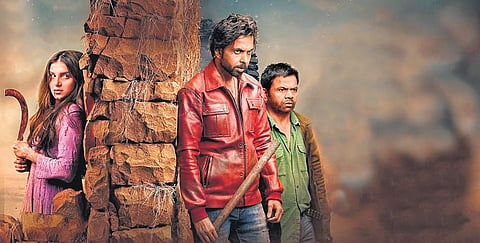

Director Nikhil Nagesh Bhat talks about the challenges of making female-led films, maintaining sensitivity while portraying crime against women on screen, and the unusual casting of Tara Sutaria in the lead
It has been an intense year for director Nikhil Nagesh Bhat. He started this year with the gory Kill, which made a killing at the festival circuits and was being lauded for its no-holds-barred action. Last week, his survival drama Apurva, which tells the coming-of-rage of a damsel after she is kidnapped by four goons, softly landed on OTT. The film stars Tara Sutaria, Abhishek Banerjee and Rajpal Yadav.
We speak to the director about the challenges of making female-led films, how he manages to be sensitive while portraying crime against women on screen, and the unusual casting of Tara Sutaria in the lead.
Excerpts:
What prompted the idea for Apurva?
I was brought up in 80s Patna. At that time, the law-and-order situation in Bihar was not great. I remember my sisters and their friends would have to return home by 6 pm. I was too young to understand this but I always thought it must be so claustrophobic for them. Growing up, I started questioning this mandate of them to have a male presence while going out, sometimes even during the day. When I started writing Apurva in 2009-10, I wanted to show that women can stand up for themselves. And when even one does, she does so for many others.
How difficult is it to get a female-led film green-lit? I read that some producers wanted you to have a male character save Tara Sutaria’s Apurva in the film?
I remember back in 2009-10, the so-called “women-centric” films were not getting made. Producers weren’t interested in films with a female lead. It’s better now since studios have opened up and the audience too has become receptive to such projects. But, yes, it took me a lot of time to reach the correct producers. I am so glad that Murad Khetani and Disney+ Hotstar believed in the story and I got to make the film that I wanted to make.
Is there any apprehension about releasing a female-led film in the theatre? Since Apurva too found a space on an OTT platform?
No, I don’t think so. I think right now all kinds of films, as long as the story is good, are doing well on the big screen. We have had women-led films like Queen (2013), Highway (2014), NH10 (2015) and all of them made great numbers theatrically. We released Apurva on OTT because of the reach Disney+ Hotstar offered us. It has a subscriber base of about 40 million. I wanted my story to reach the farthest corners of this country and even abroad and I couldn’t have asked for a better platform.
Films depicting crimes against women can be triggering for the victims and also for women in general. As a filmmaker, how do you maintain sensibility while depicting such subjects on screen?
While shooting, I ensured the scenes showing violence against Apurva were shot differently. They might make a viewer uncomfortable but I always wanted them to be thought-provoking. I wanted the audience to see nothing explicit on screen but just hear the impact. I was aware of the responsibility I had as a filmmaker. This is a subject in which there’s a line one should not cross. Women have been victims of so much aggression, sometimes in the course of their normal lives. I ensured I didn’t upset them or trigger any unpleasant memories.
Tara Sutaria is mostly known for quintessential love-interest roles. What was the thought behind casting her?
Since Tara appears to be so fragile, she fits well as a character who undergoes a massive transformation after being in an extreme situation. We didn’t want her to be a Uma Thurman from Kill Bill (2003). So, when these four goons kidnap her, they do it because she seems like a person who won’t be able to do anything. When Tara’s Apurva takes matters into her own hands, it comes as a surprise both for the goons and the viewer.
It’s good to see both Abhishek Banerjee and Rajpal Yadav, after a string of comic roles, get back to a darker space…
Both Abhishek and Rajpal did a comedy film before this (Dream Girl 2) and I was lucky to use the camaraderie they developed there for Apurva. They both are very normal-looking and the thought behind casting them was that such crimes are committed by ordinary people. For these characters, doing such crimes are part of their day-to-day lives and that makes it even more horrifying. We wanted the audience to have an unnerving experience, seeing their beloved comic actors go to the extent of such depravity.
Your film Kill is being talked about a lot in festival circles. It is billed to be one of the most original actioners to come out of the country. What was your vision behind the film?
Most of the time we see an action film, we don’t see the impact of the action on screen. I wanted the gore of an action film to be seen on camera. Moreover, Kill is a story of revenge, which is a very strong emotion and to support that feeling, all-out action was needed. We wanted to do something different, something that had never been done before.